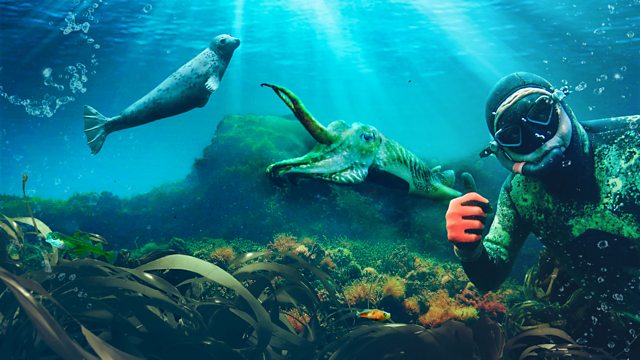
The destruction of an underwater forest and its remarkable return to life, seen through the eyes of 74-year-old freediver Eric Smith.
The story of one of Britainβs great underwater forests and one man's quest to protect it.
In the 1950s, the Sussex coast was a treasure trove of adventure for freediver Eric Smith, who started diving when he was 11. It was a spectacular world brimming with life and one of the most bio-diverse places on the planet.
Then in 1987, after devastating winter storms and a change in fisheries laws, Ericβs vibrant kelp forests were largely reduced to a barren desert.
After years of alerting the authorities to the devastation, Eric could no longer stand witness to the destruction. Along with others, his lobbying of the Sussex Inshore Fisheries and Conservation Authority helped initiate a landmark plan to ban trawling in Sussex and allow the seabed to recover.
In 2021, those efforts paid off, with a bylaw that banned trawling and protected some 300 square kilometres off the Sussex coast - the first such ban in the UK.
Now, around the UK, there are 20 trawler exclusion bans under review. The potential recovery of the Sussex seabed is a key pilot project for the UK and beyond. Kelp beds are disappearing at an alarming rate, with over 95% of these βblue forestsβ lost in location as far apart as California and Tasmania. In Britain, our kelp forests could all disappear within the next 75 years.
The loss of these hidden worlds could be devastating. The forests are vital nursery grounds for countless marine species, the kelp oxygenates the water and provides protection from storm surges and coastal erosion, and the environments they create draw down huge amounts of carbon, as well as playing a key role in reversing the impact of climate change. Our sea forest now carries the hopes of many for a better future.
Already, vast mussel beds are starting to reappear and vibrant nursery grounds of kelp beginning to return. In rare scenes, recorded by cameras left on the seabed, we see black bream fish returning to their historical nesting sites, not seen in years, to lay millions of eggs on the seabed. As the kelp starts to slowly return, the film charts remarkable scenes, from the release of rescued baby cuttlefish to an encounter with giant 40-pound stingrays.
Last on
More episodes
Previous
Credits
| Role | Contributor |
|---|---|
| Participant | Eric Smith |
| Participant | Catrine Priestley |
| Executive Producer | Sarah Cunliffe |
Broadcasts
- Fri 8 Sep 2023 19:30ΒιΆΉΤΌΕΔ One except Northern Ireland, Northern Ireland HD, Wales & Wales HD
- Fri 8 Sep 2023 20:00ΒιΆΉΤΌΕΔ One Northern Ireland HD & Northern Ireland only
- Fri 8 Sep 2023 20:30ΒιΆΉΤΌΕΔ One Wales & Wales HD only
- Fri 10 Nov 2023 20:00ΒιΆΉΤΌΕΔ One South East & South East HD only
